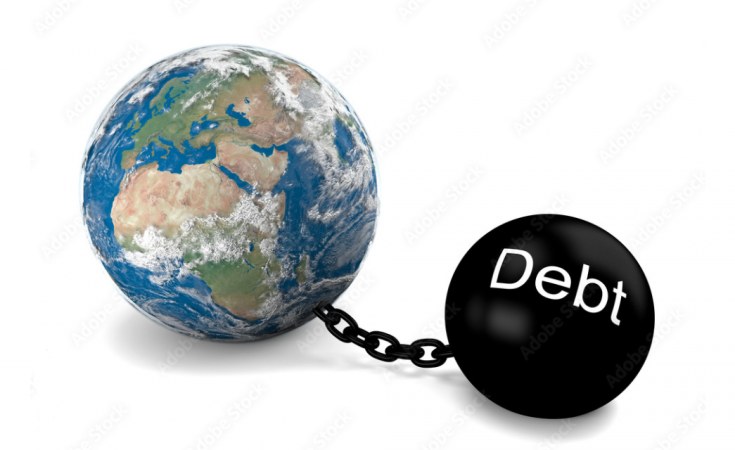Rather than having too much debt, the challenge for countries in Africa may be that their debt is just too expensive. But there are remedies.
As finance ministers, officials and NGOs fly to Marrakech for the Annual Meetings of the World Bank and IMF on 9-15 October, they should think carefully about what they can deliver to meet two criteria: ambition that meets the scale of the challenges we face; and decisions that are achievable given the current political capital available. This may sound like an impossible conundrum but African leaders have already laid out a blueprint.
With roughly five years of our current carbon budget remaining to stay within 1.5°C above pre-industrial levels - and with new World Bank data showing 8.6% of the world's population lives under $2.15 a day (unchanged since 2019) - developing countries, particularly in Africa, need a major injection of low-cost capital. Credible estimates put the external financing needs in the region of $1 trillion a year by 2030.
This much is clear, yet the leaders of countries with the power to unlock this capital are increasingly turning inwards, driven by domestic cost of living crises and internal political challenges. The limited attention on global issues tends to be drawn towards Ukraine and US-China tensions. With election season also looming in the US, EU, India and South Africa, the political window of opportunity could soon narrow, if not close.
This is the source of growing frustration among African leaders after three years of exogenous shocks - from the COVID-19 pandemic, to Russia's invasion of Ukraine and the resulting food and energy price shocks, to the debt distress that has been exacerbated by the US raising interest rates. With limited external support, increasing costs and devalued currencies eating into their purchasing power, African finance ministers have been forced to make impossible choices between servicing debt and paying civil servants or funding education and health services.
Taking on yet more debt to solve these challenges may seem a risky strategy, but new analysis casts a new light on the nature of the debt crisis. The ONE Campaign has calculated that African countries are paying a 500% premium on their borrowing from capital markets, compared to rates that could be achieved with borrowing from the World Bank. This difference will result in an additional $56 billion in debt service paid on loans taken out over the last five years. What this suggests is that rather than having too much debt, the challenge may lie in the fact that African countries' debt is just too expensive.
Thankfully, there is a solution that could be unlocked quickly with the current political capital available: reform of the Multilateral Development Bank (MDB) system.
These banks are designed to solve this problem. Because they are guaranteed by their shareholders - the world's major economies - they are considered incredibly safe and can borrow cheaply on capital markets then pass that low-cost lending onto countries that need it.
But these banks are too cautious.
Following a series of G20 commissioned expert reports calling for a tripling of MDB firepower, the system has started to move. In September, the Asian Development Bank (ADB) announced that it would unlock $100 billion over ten years through more efficient use of its balance sheet. The Asian Infrastructure Investment Bank (AIIB) announced a tripling of its climate finance by 2030. And, this week, the World Bank's Development Committee will discuss a proposal "Ending Poverty on a Livable Planet" to unlock an additional $100 billion over ten years and reform the Bank's mission and operations to be more effective.
This is progress, but not at the scale or speed needed.
At the Africa Climate Summit this September, leaders laid out a financial reform agenda calling for a package of measures to meet current challenges. This included unlocking $500 billion a year from the MDB system and unleashing the power of IMF Special Drawing Rights, an international reserve asset, to boost lending power.
At the World Bank and IMF annual meetings, leaders should decide to implement this agenda through doing three things:
First, they should commit to incorporate "callable capital" into development banks capital adequacy frameworks by April 2024. This is a guarantee that already exists, committing major economies to step in if the banks get into trouble. If the banks considered it as part of their risk assessments they could lend much more while maintaining their credit ratings. Recent estimates suggest the World Bank alone could release $190 billion as a result.
Second, donor economies should decide to use their Special Drawing Rights to leverage MDB capital. The African Development Bank has put forward a "hybrid capital" proposal that would not spend the SDRs but use them as collateral leveraged four times over. Five donors should commit $1 billion each to unlock this pilot of $20 billion. The precedent could be game changing. There are currently $375 billion SDRs sitting unused in advanced economies. Leveraged four times this could unlock $1.5 trillion.
Third, IMF shareholders should approve a third seat on the Executive Board of the IMF for sub-Saharan Africa. This would build on the African Union being granted a seat at the G20 and respond to ongoing frustrations about the lack of African representation in the governance of the Bretton Woods Institutions.
Taking these steps would build the resilience of African economies and help them invest in climate solutions for the future, while addressing the trust deficit between Africa and Europe and North America in the wake of COVID-19 and Russia's ivasion of Ukraine. These are "no-regret" decisions.
David McNair is Executive Director at The ONE Campaign, Non-Resident Scholar at the Carnegie Endowment for International Peace and sits on the European Council for Foreign Relations.


